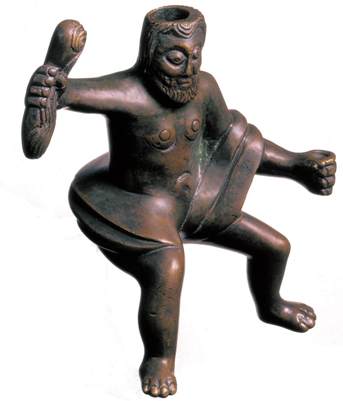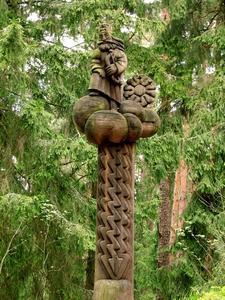
Lithuanian prechristian religion belongs to the great group of Indoeuropean Baltic religions, including also the Latvian paganism, which is very close to the Lithuanian one especially for names of Gods, and the Prussian one, whose trails have been lost, as happened for the ancient Prussian language, when the Teutonic Knights invaded the region during late Middle Age. The Lithuanian religion, like the Latvian one, has never been estinguished at all even though those countries were converted to christianity; Lithuanian modern pagans agree in saying that christianity inside their societies is only a superficial layer. The description we have of those religion often reveal a strong christian influence on them; this influence derives from the radically different point of view of a christian observer: the incompatibility of pagan and christian worldviews can thus lead to misunderstandings.
An example: it is usually said that the main deity of Lithuanian paganism was Dievas, often defined “Supreme Being of Sky” in some text about history of religions. This sort of definition, probably coming from christian observers' deductions, written in the centuries of conversion, is maybe extraneous to Lithuanian paganism: Dievas, whose name comes from the same Indoeuropean root, dyaus, from which also the names Zeus and Jupiter derived, is the God of the diurnal sky, and interacts with another god, Velinas, god of the nocturnal sky, as was Veiovis in Roman religion. This interaction between day and night doesn't imply a good-bad dynamic, even if this was the interpretation of it made by pushing christianity, which wanted to identify the former with its own god and the latter with the devil. Dievas and Velinas represent actually opposite forces balancing each other in a dynamic balance which is harmony: the concept of harmony, Lithuanian darna, is a basic conception of Baltic religion, and it is very close to Heraklit's philosophy. Images of Velinas could be usually found in houses and continued to stay even after the conversion and the final identification of this god with the christian devil. Another god who was very important and still is in the rebirth of Lithuanian Paganism is Perkunas: to Perkunas oaks and eternal sacred fires burning in woods and nourished by the high priest, the krivis, were consecrated. Perkunas was thunder and storm; he was also connected to the war and so was worshipped by nobles and soldiers. But as a young god was also a god of fertility, maybe because of the connection between the thunder and the rain that fertilizes the earth.

An ancient image of Perkunas
The earth, Zemyna, was very important too: every evening a litany in honour of her was recited, ending with a kiss on the soil. Zemyna was considered daughter of the sun, Saule, and the moon, Menules. Contrary to what generally happens in Southern Europe, according to Lithuanians' worldview the sun was a goddess and the moon a god; inside the name of the god Menules we can recognize the root men- which refers to time measuring, but we don't know if Lithuanians had a solar, lunar or lunisolar calendar. Zemyna was clearly the earth with her mother features, it means the fertile earth; the fact that she was considered daughter of the sun and the moon underlines this feature, meaning that fertility of earth is due to the time (measured by the moon) and to the energy of the sun.
Cimoyok, quoted in some ancient german sources, was a god of fields, and his simulacra, made by pieces of the same wood tied together, stood next to the oldest bushes of the field. While the sacred fire in the woods was dedicated to Perkunas, Lithuanian goddess of fire was Gabija, and the god Dimstipatis, whose name means “lord of the farm”, preserved fireplaces in houses and received as offerings some chickens.
A simulacrum of Cimoyok
Offerings were also given to the goddess Zverine, who seems to be very similar to the Greek goddess Artemis: Zverine was considered protectress of dogs, so she could have been a huntress, but she was also connected to fertility, in a similar way Artemis was connected to good birth. Medeine, goddess of the woods' hares, could be another deity connected to the hunt.
Manuela Simeoni

A modern image of Perkunas
Reproduction of site contents, unless otherwise indicated, is allowed if you correctly quote the site and attribute the passage you quote to its author. For further information: info@giornopaganomemoria.it